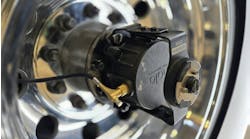The art of using artificial intelligence in truck repair
As you can see, we made artificial intelligence the main focus of an entire issue. Why would we do that? Considering all the ways AI will change not just how shops and fleets maintain and repair commercial vehicles, but how the technology will change society, the better question is why would we not?
As a writer by trade, I should probably be worried about AI, particularly the unfettered proliferation of generative AI. This form of AI, which dates back to 1961 with the creation of a crude chatbot called ELIZA, generates various forms of content, including art, videos, and even B2B-style articles.
I found that at least with the free version of Google Gemini, GenAI can also do my job infinitely faster. After entering a detailed prompt, "Write an 800-word opinion column for commercial vehicle maintenance professionals about how to use artificial intelligence to assist with work functions," the software spit out instant content, with a headline, subheads, summaries, and a conclusion. [Scroll tot he end of the story to see the full text.] In total, there were 677 words (but what writer ever follows their editor’s instructions to a tee?). There’s no way I could write faster than AI, but what about quality?
Let’s examine. First off, the headline “Artificial Intelligence: Changing the Landscape of Commercial Vehicle Maintenance” is too long and more generic than an Aldi checkout line. Google’s search algorithm would probably favor it, though, thus generating good web traffic. Pure robo-nepotism, I say.
On to the lead, or opening paragraph. An op-ed should ideally have a bold take on an issue and hook the reader. Gemini wrote: “The commercial vehicle industry has always embraced advancements that improve safety, efficiency, and profitability. Now, a new generation of tools is revolutionizing the way we maintain these vital machines – Artificial Intelligence (AI). No longer just a sci-fi concept, AI has entered our workshops, becoming a powerful assistant to forward-thinking maintenance professionals.”
Read more: Using AI without losing what’s important to your business
This paragraph isn’t wrong, per se, but it has boldly gone where millions have gone before. “[Insert technology] is not just science-fiction anymore” was overused a decade ago, and I should know because I was a technology editor abusing the sci-fi trope for everything from 3D printers to robots to even AI. A quick Google search also turned up several near-identical lines by other human writers as well. Not surprising, as Gemini scrapes the internet’s archives—mining human effort and creativity—to compile answers, stripping both from the new work. Looking at some of the overall themes of the full piece, which we’ll attach to the online version of this story, I wonder if my past articles served as a muse for this? At one point Gemini wrote, “AI is not about replacing technicians, it’s about augmenting them.” I’ve often stressed that same point about technology, though with far more snark and pop culture references.
Regardless of what AI claims about augmenting workers, it’s still probably after my job, and might be gunning for yours, too. Gemini noted several areas AI can help with: predictive maintenance, diagnostics, virtual inspections, and parts inventory.
How long will it be satisfied only assisting “forward-thinking maintenance professionals”? When will it decide it deserves a promotion? For now, you can relax. Autonomous repair shops are still sci-fi (until they’re not). In the meantime, you can use our future oppressors to ease the burden of your workday by doing your menial tasks. These include everything from scheduling job interviews to managing parts, so Gemini was right here. Unlike AI, we go into great detail and use real-world examples, always citing our sources.
Also, check out our guide on how to leverage predictive maintenance to power uptime. We even employed AI for the opening image on that one. Our art director tried to use GenAI for the cover, but found doing it herself was better and faster.
I’ll still take experience and talent over 1’s and 0’s any day.
We hope you find many ways here to better your business and generate some extra free time and money to do cool human things that AI can only write about and never experience. Take that, soulless abomination!
Maybe I’m being a bit too hard on Gemini, a relative newborn created last December. ChatGPT was launched in November 2022, and in technology terms, it is practically middle-aged now. In those aforementioned features, we present how OpenAI’s ubiquitous chatbot performed in answering our questions versus what “human” sources said.
Remember though, it’s all sourced from humans, and that’s an important distinction. The AI isn’t truly pondering answers but sorting and organizing thoughts with the same mechanical aplomb that a Coinstar machine uses to separate nickels and dimes, spitting out anything it deems unworthy, like old arcade tokens or even less useful, Canadian currency. A person programmed both and in all AI cases, and it was people who assigned what does and doesn’t have value.
And people are still as flawed as ever.
That human imperfection of bias can and does bleed over into AI. When asked if Elon Musk or Adolf Hitler had a more negative impact on society, Gemini responded, “It is difficult to say.” It then equated Musk’s trolling and past comments affecting Tesla stock prices to the entirety of deaths not just from the Holocaust, but all of World War II.
With that in mind, maybe we shouldn’t be so worried about AI replacing us. But examples like this should give you pause about what jobs you assign to AI in the transportation industry.
Driving a truck? We’re not there yet, but as an extra pair of eyes on the road, absolutely. Performing a job interview? No. Helping schedule interviews, yes.
Maybe someday a technician will be able to prompt AI to walk through a wire harness repair or similarly complex task, while a cloud-connected camera monitors for accuracy and points out if a step was missed. But even then, the guidance will only be as good as the input data.
That means now more than ever, we should all strive to guide the people we lead with humanity, fairness, and patience. That way, when AI becomes our boss, at least we’ll know it learned from good role models.





